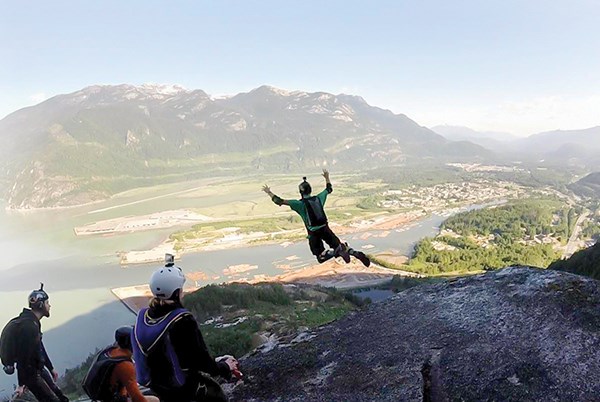Squamish is home to a community of BASE jumpers, skydivers and others who prefer to take to the air for fun and sport.
The Squamish Chief sat down with veteran skydiver and BASE jumper Kane Gray to talk about his sports and the community in Squamish.
Q: What misconceptions are there about BASE or about so-called “extreme” sports in the corridor? (BASE stands for the different surfaces that can be jumped from: building, antenna, span and earth/cliff.)
A: That there is an increased exposure to risk, as with any sport this is true to an extent. These risks, however,
are minimized through the proper use of equipment, experience, local knowledge and sound understanding of weather and environmental conditions; similar to that of someone preparing to venture into the backcountry after a snowstorm.
Q: Briefly, what is your history with skydiving and other such sports in the area?
A: I have been a professional skydive instructor in the Whistler/Vancouver area since moving to Squamish in 2007. I have been involved with the local BASE-jumping community since that time and recall when there were only four active jumpers.
Last year I achieved my 6,000th skydive and prior to that I travelled the world skydiving and BASE jumping and competed in skydiving at a national level.
Q: What are the qualities of the Stawamus Chief, other than it is high, that make it a great place as a jumping-off point for all kinds of sports?
A: Biggest would be accessibility and the scenery! Squamish is unique as there are very few other places in Canada that you can BASE from.
Wind plays an important role in flying or jumping off the Chief. BASE jumping you want little to no wind, speed flying or paragliding a light to steady breeze is preferred.
Q: What inspired you to take up skydiving and what do you love about it?
A: Growing up in New Zealand there is a lot of awesome things to do! For me it was a progression from surfing, snowboarding and skateboarding that led me to find the next exciting sport. I enjoy the freedom, friendships, bonds and common interest you share with others doing a sport that you love.
Q: I hear there’s a lot athleticism and self-regulation to BASE. Can you explain a bit about that?
A: You need physical stamina, coordination, lightning-fast reaction times and a sense of adventure. You need mental endurance and the ability to remain calm, focused and trust your own judgment and experience. BASE jumping, for the most part, is self-regulated by an extremely close-knit community that respects and looks out for one another and the objects they jump from. Mentorship is how everyone begins and this carries on throughout his or her time in the sport.
Q: Some people see BASE/skydiving as too risky. What is your response to that?
A: As with all extreme sports there are additional risks, but managing these risks effectively is what makes them so satisfying, rewarding and exciting. With proper training, experience and equipment these risks are greatly minimized. I’m not sure how accurate it is, but I tell nervous skydiving students, you have more chance of being struck by lighting twice than dying skydiving.
Q: Can you tell us a bit about the safety precautions you take?
A: Absolutely! It begins with years of hard work and dedication to place yourself in a position to be involved safely in these sports. Most people are experienced skydivers before they do their first BASE jump. Equipment safety checks are paramount and go without saying. A lot of time and precision goes into packing a BASE rig.
Other big factors are mental preparedness and a heightened level of situational awareness.
Weather conditions play a crucial role in both skydiving and BASE jumping. Leading up to a jump you become engrossed in even the most subtle changes in your weather environment. Even in the last few seconds you are still prepared to back down if you become uncomfortable with a change in that situation.
Q: BASE jumping is banned in Ontario’s provincial parks and in two national parks. What would result from a ban here?
A: I don’t believe that banning BASE jumping would stop people from doing it. It may slow activity down, but could actually add more risk by driving people to go in less favourable conditions or times of the day or night.
Q: As you know, we have lost two men in the last year when they leapt off the Stawamus Chief for their sports. How do you put those deaths in perspective?
A: Any death is a tragedy, those individuals had huge respect and following, they were loved by their friends and families and their spirits fly on.
They will be remembered positively and for truly doing what they loved.



